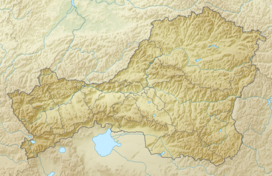Tannu-Ola mountains: Difference between revisions
Khan Tengri (talk | contribs) |
m convert enum to hlist |
||
| (42 intermediate revisions by 33 users not shown) | |||
| Line 1: | Line 1: | ||
{{short description|Central Asian mountain range}} |
|||
| ⚫ | |||
{{ |
{{More citations needed|date=April 2023}} |
||
{{Infobox mountain |
|||
The '''Tannu-Ola mountains''' ([[Tuvan language|Tuvan]]: {{lang|tyv|Таңды-Уула}} '''Tangdy-Uula mountains''') is a mountain range in southern [[Siberia]], in the [[Tuva|Tuva Republic]] of [[Russia]]. It extends in an east-west direction and curves along the [[Mongolia]]n border. Its highest peaks reaches 2,930 m. |
|||
| name=Tannu-Ola Mountains |
|||
| other_name=''Таңды-Уула'' / ''Tañdı-Uula'' |
|||
| ⚫ | |||
| photo_caption= |
|||
| country= [[Russia]] |
|||
| subdivision1_type=[[Federal subject]] |
|||
| subdivision1= [[Tuva]] |
|||
| highest=Unnamed |
|||
| elevation_m= 3061 |
|||
| coordinates= |
|||
| length_km= 1300 |
|||
| width_km= |
|||
| area_km2= |
|||
| ⚫ | |||
| range_coordinates_ref= |
|||
| parent= [[South Siberian System]] |
|||
| geology= {{hlist|[[Sandstone]]|[[schist]]|[[Conglomerate (geology)|Conglomerate]] (West)|[[Granite]] (East)|[[effusive rock]] (East)}} |
|||
| orogeny= |
|||
| map= Russia Tuva Republic |
|||
| map_caption= Location in the Tuva Republic, Russia |
|||
}} |
|||
The '''Tannu-Ola mountains''' ({{langx|tyv|Таңды-Уула}}, ''Tañdı-Uula'', {{lang-uniturk|Taᶇdь-Uula}}, {{IPA-all|tʰaŋˈtɯ ˈuːla}} – '''Tangdy-Uula mountains'''; {{langx|mn|Тагнын нуруу}}, ''Tağnîn nurú'', {{IPA-mn|tʰaɢˈniŋ nʊˈrʊː}}, {{langx|ru|Танну-Ола}}, {{IPA|ru|tɐnˈnu ɐˈla|}}) is a mountain range in southern [[Siberia]], in the [[Tuva|Tuva Republic]] of [[Russia]]. It extends in an east–west direction and curves along the [[Mongolia]]n border. Its highest peak reaches {{convert|3061|m|ft|abbr=on}}. The Tannu-ola mountains are mentioned in the 13th-century text ''[[The Secret History of the Mongols]]'' under the name "Tanglu mountains" (唐麓), and also in the ''JāmiʿAl-tawārīkh'' of [[Rashid-al-Din Hamadani]] (1247–1318) under the name "Toungat mountains" (تنغات). By the [[Qing dynasty]] the name has been changed to Tangnu (唐努) mountains, from which the modern name is derived. All names are probably rooted in the old Turkic word ''taŋ'' - "wonder, awe, wondrous." |
|||
== Geography == |
== Geography == |
||
The northern slopes are part of the watershed of the [[Yenisei River]], facing the western [[Sayan Mountains]]. |
The northern slopes are part of the watershed of the [[Yenisei River]], facing the western [[Sayan Mountains]]. The eastern end touches the large watershed of the [[Selenge River]] in [[Mongolia]]. |
||
| ⚫ | The foothills of the southern slopes cross into Mongolian territory. They form the northern limits of a large basin of [[steppes]] that extends south to the Mongolian [[Altay Mountains]] and includes the salt lake [[Uvs Nuur]]. The western end is located near the northern Altay Mountains in the Russian [[Altai Republic]].<ref>"Tannu-Ola", [[Great Soviet Encyclopedia]]</ref> |
||
The eastern end touches the large watershed of the [[Selenge River]] in [[Mongolia]]. |
|||
| ⚫ | |||
The western end is located near the northern [[Altay Mountains]] in the Russian [[Altai Republic]]. |
|||
==See also== |
==See also== |
||
| Line 14: | Line 34: | ||
*[[Ubsunur Hollow Biosphere Reserve]] |
*[[Ubsunur Hollow Biosphere Reserve]] |
||
==References== |
|||
| ⚫ | |||
{{Reflist}} |
|||
| ⚫ | |||
| ⚫ | |||
[[Category:Mountain ranges of Russia]] |
[[Category:Mountain ranges of Russia]] |
||
[[Category:Mountain ranges of Mongolia]] |
[[Category:Mountain ranges of Mongolia]] |
||
[[Category:Landforms of Tuva]] |
|||
[[Category:South Siberian Mountains]] |
|||
[[de:Tannu-ola-Gebirge]] |
|||
| ⚫ | |||
[[es:Montes Tannu Ola]] |
|||
| ⚫ | |||
[[fr:Mugur-Sargol]] |
|||
[[lb:Tannu-ola-Bierger]] |
|||
[[nl:Tannoe-Olagebergte]] |
|||
[[nn:Tannu-Ola-fjella]] |
|||
[[pl:Tannu-Oła]] |
|||
[[ro:Munții Tannu-Ola]] |
|||
[[ru:Танну-Ола]] |
|||
[[fi:Tannu-Ola]] |
|||
[[tr:Tannu-Ola]] |
|||
[[uk:Танну-Ула]] |
|||
Latest revision as of 21:18, 3 November 2024
This article needs additional citations for verification. (April 2023) |
| Tannu-Ola Mountains | |
|---|---|
| Таңды-Уула / Tañdı-Uula | |
 | |
| Highest point | |
| Peak | Unnamed |
| Elevation | 3,061 m (10,043 ft) |
| Dimensions | |
| Length | 1,300 km (810 mi) |
| Geography | |
| Country | Russia |
| Federal subject | Tuva |
| Range coordinates | 51°04′12″N 92°23′25″E / 51.07000°N 92.39028°E |
| Parent range | South Siberian System |
| Geology | |
| Rock types |
|
The Tannu-Ola mountains (Tuvan: Таңды-Уула, Tañdı-Uula, Uniform Turkic Alphabet: Taᶇdь-Uula, IPA: [tʰaŋˈtɯ ˈuːla] – Tangdy-Uula mountains; Mongolian: Тагнын нуруу, Tağnîn nurú, Mongolian pronunciation: [tʰaɢˈniŋ nʊˈrʊː], Russian: Танну-Ола, [tɐnˈnu ɐˈla]) is a mountain range in southern Siberia, in the Tuva Republic of Russia. It extends in an east–west direction and curves along the Mongolian border. Its highest peak reaches 3,061 m (10,043 ft). The Tannu-ola mountains are mentioned in the 13th-century text The Secret History of the Mongols under the name "Tanglu mountains" (唐麓), and also in the JāmiʿAl-tawārīkh of Rashid-al-Din Hamadani (1247–1318) under the name "Toungat mountains" (تنغات). By the Qing dynasty the name has been changed to Tangnu (唐努) mountains, from which the modern name is derived. All names are probably rooted in the old Turkic word taŋ - "wonder, awe, wondrous."
Geography
[edit]The northern slopes are part of the watershed of the Yenisei River, facing the western Sayan Mountains. The eastern end touches the large watershed of the Selenge River in Mongolia. The foothills of the southern slopes cross into Mongolian territory. They form the northern limits of a large basin of steppes that extends south to the Mongolian Altay Mountains and includes the salt lake Uvs Nuur. The western end is located near the northern Altay Mountains in the Russian Altai Republic.[1]
See also
[edit]References
[edit]- ^ "Tannu-Ola", Great Soviet Encyclopedia

